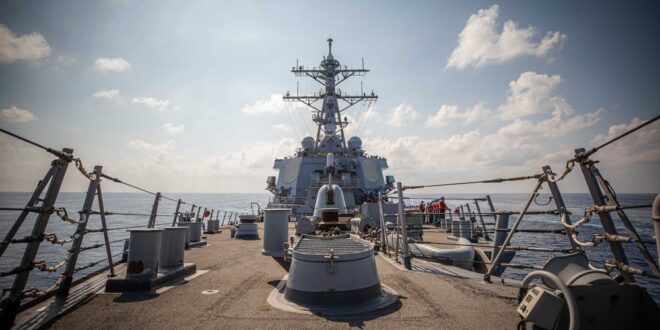Latest Developments
The Iran-backed Houthis in Yemen fired a ballistic missile and drones at three commercial vessels on December 3. Additionally, the USS Carney, a Navy destroyer, downed a drone headed in its direction, though the “specific target” of the attack was unclear, according to a United States Central Command (CENTCOM) statement. “The weapons here are being supplied by Iran,” U.S. National Security Advisor Jake Sullivan said on December 4. “Iran, we believe, is the ultimate party responsible for this.” CENTCOM said the United States, along with its partners, will “consider all appropriate responses” to the incidents.
Expert Analysis
“Not satisfied with threatening international shipping in the Persian Gulf and the Strait of Hormuz alone, Iran once again is using its terror proxy in Yemen to threaten vessels in the Red Sea. The United States should organize an international effort — which includes Egypt, Saudi Arabia, the UAE, Bahrain, Israel, G-7 allies, and others — to escort commercial vessels through the Red Sea. The same coalition should be used to increase the interception of arms Iran is smuggling to Yemen. Meanwhile, Washington should also make clear that force protection for U.S. naval vessels will require them to respond to any future Houthi attacks with strikes on the military infrastructure in Yemen used to launch or facilitate such attacks.” — Bradley Bowman, Senior Director of FDD’s Center on Military and Political Power
“The U.S. military has yet to respond to flagrant Houthi attacks on U.S. warships and international shipping, as the Biden administration fears escalating the conflict with Iran’s proxies in the Middle East. Iran and its proxies view this lack of response as weakness, not restraint. It is a matter of time before one of these attacks on U.S. Navy personnel succeeds in killing American sailors.” —Bill Roggio, Senior Fellow and Editor of FDD’s Long War Journal
“Houthi attacks on commercial shipping are likely intended to increase calls for a ceasefire by inflicting economic damage on countries that would otherwise be uninterested in the Gaza conflict.”— Ryan Brobst, FDD Senior Research Analyst
The Houthis’ Attacks
At approximately 9:15 a.m. local time on December 3, the USS Carney identified an anti-ship ballistic missile fired at the M/V Unity Explorer, a Bahamas-flagged bulk cargo ship owned and operated by the United Kingdom, from a Houthi-controlled area in Yemen. The missile landed in the Unity Explorer’s vicinity. Almost three hours later, the USS Carney shot down a drone headed in its direction. At approximately 12:35 p.m., the M/V Unity Explorer sent a distress signal saying it was hit by missiles fired from Houthi-controlled areas. While responding to the M/V Unity Explorer’s distress call, the USS Carney detected and downed a second drone. No damage was reported.
The same day, the Houthis also attacked two commercial vessels, the M/V Number Nine and the M/V Sophie II. Both vessels reported being hit by missiles.
Houthi’s Anti-Ship Arsenal
During a military parade in the coastal city of Hudaydah on September 1, 2022, the Houthis showcased a range of newly unveiled anti-ship missiles. One of these missiles, the Falaq 1, is a surface-to-sea ballistic missile, while another called the al-Mandeb 2 is an anti-ship cruise missile. In addition, the Houthis displayed their Rubezh coastal defense systems and the Soviet-made P-15M Termit anti-ship missile.
The Houthis have demonstrated proficiency in using anti-ship weapons before, specifically against Saudi-led coalition forces off the Yemeni coast. On October 1, 2016, the Houthis struck the HSV Swift, an Emirati-operated military vessel, with an anti-ship missile. On January 30, 2017, an unmanned suicide boat detonated next to a Saudi al-Madinah class frigate in the Red Sea, resulting in the deaths of two Saudi sailors.
 Eurasia Press & News
Eurasia Press & News




